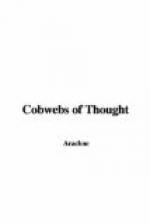And that we are: “freed by the throbbing impulse we call Death.” But he ends by fearing that were it possible Zeus must have revealed it.
This passionate pathetic longing for joy, and life beyond death finds an echo in many hearts, which yet can admire the grand altruism of “The Pilgrims” and the selfless spirit of the Impersonal Martyr. After considering all this clash of thought, it seems as if it all resolved itself into the individual temperament which settles and modifies and adapts to itself the forms of our philosophies and religions, our Hopes and Faiths, and Despairs.
For from whence comes the real power thinkers possess over us? It is not in their forms of thought, as Matthew Arnold said most truly, but in the tendencies, in the spirit which led them to adopt those formulas. Every thinker has some secret, an exact object at which he aims, which is “the cause of all his work, and the reason of his attraction” to some readers, and his repulsion to others.
What was the secret aim then in George Eliot which made her believe so firmly in the permanent influence of Humanity, and in the annihilation of personal existence? Was the tendency of temperament developed by her life and circumstances?
What was it that developed so strong an Individualism in Carlyle and Browning and awoke in Browning such unlimited hope, and in Carlyle such “unending sadness?”
Why did the darkness and the storm of his life give Mazzini so passionate a belief in Humanity, and such an intimate faith in God? These and such-like are the problems we should have in our minds as we study the works of Great Writers, if we would penetrate into the innermost core of their nature, in short, if we would really understand them.
III.
MAETERLINCK ON HAMLET.
Maeterlinck, in his first essay, “The Treasure of the Humble,” is, undoubtedly, mystical. He does not argue, or define, or explain, he asserts, but even in that book and far more so in his second, “Wisdom and Destiny,” it is real life which absorbs him as Alfred de Sutro his translator points out. In this book “he endeavours in all simplicity to tell what he sees.” He is a Seer.
Maeterlinck’s aim is to show that contrary to the usual idea, what we call Fate, Destiny, is not something apart from ourselves, which exercises power over us, but is the product of our own souls.
He takes many examples to prove this, of which Hamlet is one. Man, said Maeterlinck, is his own Fate in an inner sense; he is superior to all circumstances, when he refuses to be conquered by them. When his soul is wise and has initiative power, it cannot be conquered by external events, and happiness is inevitable to such a soul. Maeterlinck asks: Where do we find the fatality in Hamlet? Would the evil of Claudius and Queen Gertrude have spread its influence if a wise man had been in the Palace?




